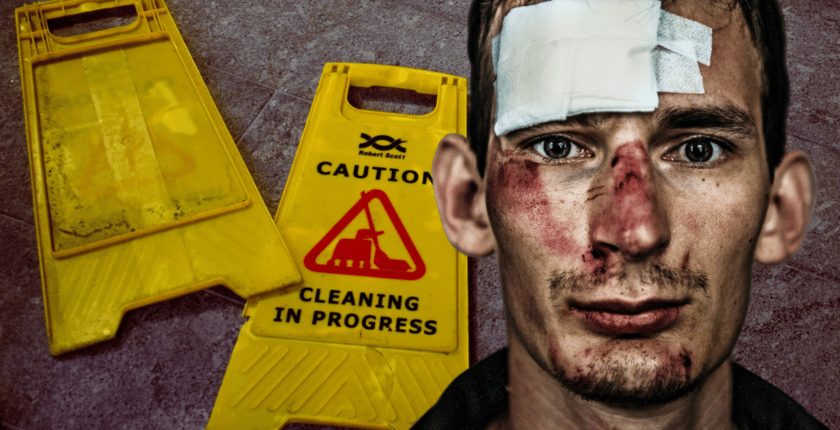ACC When Cleaners Health and Safety goes Awry
Accidents happen, and in industrial cleaning services, there is always a possibility that things can go wrong. But when they do, it’s critical to deal with workplace injuries and diseases efficiently. Paying attention to legislation and processes is the cornerstone of dealing with industrial accidents and diseases.
New Zealand Health And Safety At Work Act 2001
The Health and Safety at Work Act 2015 (HSWA) sets out what policies and procedures must be in place in the workplace in New Zealand. Cleaning Services (and all other businesses) are obliged to have worker engagement practices, to manage the risks in workplaces, and cleaning workers are obliged to adhere to these procedures. The Act covers most aspects but additional measures can also be implemented.
YouTube has an informative Health & Safety at Work Act Presentation by Gordon MacDonald that is worth a watch. It’s important to note that all businesses must ensure, the health and safety of their workers, and any other workers who are influenced or directed by the business. But it is limited by the term “so far as reasonably practicable.” Looking closer at these two issues:
- The question arises whether the cleaning service or their client is required to put policies in place, or whether it is the clients’ responsibility. Employment New Zealand says that the regulations apply to employees and contractors. The onus is on both parties to ensure the cleaners’ safety.
- What is reasonably practicable? The concept elicits much debate as ‘reasonably’ means doing what other cleaning services and employers would reasonably do in the same situation. ‘Practicable’ means possible or capable of being done. It’s not entirely the same thing.
To guide businesses to stay within the law the Ministry of Business, Innovation, and Employment (MBIE) have a Health and well-being policy builder that helps develop processes.
Managing Risks And Hazards
Whether it’s commercial cleaning services, industrial, or domestic, there’s an obligation on them all to do everything reasonably practicable to keep cleaners safe and healthy. Minimizing risks or hazards needs a closer look at operations, to see how these can be reduced. Frequent interventions include replacing noisy equipment that can impair hearing, and warning signs on slippery floors. Providing appropriate safety gear is the first barrier against potential disease or injury.
While cleaners also must look out for their own safety, and participate in safety protocols, industrial cleaners are exposed to higher risks and caution must be exercised. Training for industrial cleaners helps reduce risks, but finding industrial cleaners is challenging. It’s more difficult to find cleaners who already have some training.
The Accident Compensation Act (ACC)- Briefly
So what happens when an injury occurs despite all efforts to keep cleaners health and safety a priority?
The Accident Compensation Act is sometimes just called ACC. ACC is the “Accident Compensation Corporation”, the government organization that manages the accident compensation scheme and makes decisions about claims. In industrial cleaning circles, it means the whole scheme, and the claims procedures and compensation.
A workplace accident in NZ is a work-related personal injury. A notifiable injury or illness includes:
- Any injuries or illnesses that require immediate treatment (other than first aid). Included are amputations, serious head, eye, or burn injuries, de-gloving or scalping of the skin, spinal injury, loss of bodily function, or serious lacerations.
- An injury or illness that requires immediate hospitalization.
- An injury or illness that requires medical treatment within 48 hours of exposure.
- A serious infection (including occupational zoonoses) where carrying out normal duties is a significant contributing factor, including:
- working with micro-organisms
- providing treatment or care to a person
- contact with human blood or bodily substances
- handling or contact with animals, or any part or product
- handling or contact with fish or marine mammals.
- Any other injury or illness declared a notifiable injury.
A notifiable incident in a workplace is an unplanned or uncontrolled event that exposes a cleaner to serious health or safety but doesn’t include controlled activities taking place as part of the normal business of the cleaning services. Community law published a useful article. It gives insight into when you’re covered by ACC and when you’re not.
Accident compensation may be paid if cleaners cannot work because of a serious injury or work-related condition. Doctors can advise on filling out an ACC form and- if the claim is accepted, the cleaner is paid 80 percent of earnings until their return to work. Cleaning services companies pay for the first week only and then ACC pays the rest. Partial refunds on doctor’s visits are considered by the ACC.
As far as cleaners go, a useful interview question is to find out how the cleaner intends to take responsibility for health and safety. It’s also important to find out whether there are any pre-existing occupational diseases that the cleaner may suffer from.
The NZ Herald reports that around 50 people are killed at work in New Zealand annually, and an estimated 600-900 people die as a result of work-related diseases. Don’t end up being in the headlines, like the recent article, “One dead in workplace accident.”
Disclaimer: Please note that this article is not legal advice. For clarity, please speak to your solicitor.


